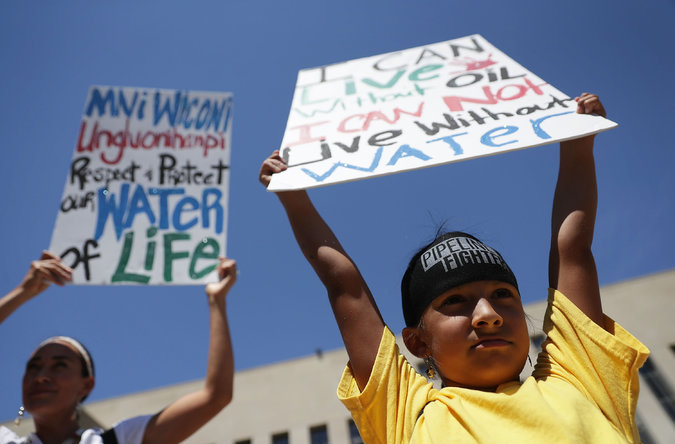Over the past year, the Standing Rock Sioux Tribe’s protests against the Dakota Access Pipeline (DAPL) have been making headlines. DAPL is a 1,172 mile long underground oil pipeline project which costs $3.7 billion and would cross four states. It would stretch from the Bakken Formation – a vast underground deposit where Montana and North Dakota meet Canada to the southeast into South Dakota, Iowa and Illinois.
The Standing Rock Sioux tribe’s plea to stop the construction of the pipeline reflects the mistreatment of Native Americans that is part of an overarching story that many forget exists. The history of Native Americans is plagued with violence, threatening government policies and the removal of their cultural identity. With this knowledge, it is evident that we can not talk about the Dakota Access Pipeline without talking about the history of the mistreatment of the Native American population in the US.
Reason For Building the Pipeline
According to the U.S. Geological Survey, an estimated 7.4 billion barrels of undiscovered oil is believed to be in its U.S. portion. The pipeline would cause an economic boom and significantly decrease U.S. reliance on foreign oil, the developer Energy Transfer Partners said. The pipeline would also help free up railways to transport “crops and other commodities currently constrained by crude oil cargos.”
Reason For Opposition
The Standing Rock Sioux Tribe opposes the pipeline’s construction near the Sioux reservation, part of the Standing Rock Native American Reservation in North Dakota and South Dakota. They fear it will pollute their drinking water, and argue that it has disturbed burial grounds and violated the terms of an 1851 treaty.
Protests at the pipeline site in North Dakota began in the spring of 2016, drawing other tribes from North America as well as non-Native American supporters. An encampment of Standing Rock Sioux and their allies has occupied the area near where the route of the pipeline. Additionally, many have protested in solidarity demonstrations throughout the world.

Legal Action Against the Pipeline
The tribe filed a lawsuit against the U.S. Army corps of Engineers, which approved permits to allow the pipeline to cross the Missouri River, asking for a temporary injunction against the construction of the pipeline.
In September, a federal judge denied the injunction. However, the Department of Justice, the Army and the Department of the Interior requested that Energy Transfer Partners, the pipeline builder, delay all work within 20 miles of the land bordering or under Lake Oahe during this review.
History Filled With Pain And Struggle
The injustices towards Native Americans started in 1492 when Christopher Columbus stumbled on the Americas and the European expansion into North America that followed soon after. Disease brought by the settlers along with wars between tribes and American settlers caused thousands of deaths among Natives, land dispossession, oppression and racism. This was just the beginning of the suffering they would continue to face over the next hundreds of years.
In 1830, the federal Indian Removal Act called for the removal of the ‘Five Civilized Tribes’ , the Cherokee, Chickasaw, Choctaw, Creek and Seminole. The journey from the southern states to “Indian Territory” in Oklahoma is known as the Trail of Tears with 4,000 Cherokee people dying of cold, hunger, and disease. In 1850, the California state government passed the Act for the Government and Protection of Indians. The act “facilitated removing California Indians from their traditional lands, separating children and adults from their families, languages, and cultures”. This California law provided for “apprenticing” Indian children and adults to Whites and punished “vagrant” Indians by “hiring” them out to the highest bidder at a public auction if they could not provide sufficient bond or bail, essentially equating to slavery. In the early 1900s, the Supreme Court ruled that the federal government has the right to overturn all Cherokee laws in the precedent-setting decision Cherokee Nation v. Hitchcock. In 1949, the Hoover Commission urged the assimilation of the Natives with. One year later, the Commissioner of Indian Affairs began to implement ‘withdrawal planning’, or the termination and relocation of thousands of Natives to cities.

These past atrocities, to just name a few, against Native Americans reflect the continuous oppression of Native Americans that with the Dakota Pipeline has demonstrated that the mistreatment is still starkly present in our society. For hundreds of year, a mixture of colonial conflict, atrocities and policies of discrimination has devastated the Native American population. Even today, Native Americans face large challenges to cope with the disadvantages history has left them and ongoing cases of discrimination. However, this struggle is not recognized nor discussed enough.
Future Outlook
While the Army recently announced it would not allow construction of the final piece of the pipeline, the outlook does not look bright. The election of Donald Trump increases the likelihood of its construction since protesters fear he is likely to support the pipeline. Campaign financial disclosure forms first reported by The Guardian showed that Trump held $500,000 to $1 million in Energy Transfer Partners stock and another $500,000 to $1 million in another company with a stake in the pipeline. If the construction of the pipeline goes forward in 2017, this marks another case added to the endless number of instances where the voices of Native Americans have been ignored.
By Ananiya Kumar Neeck

































































